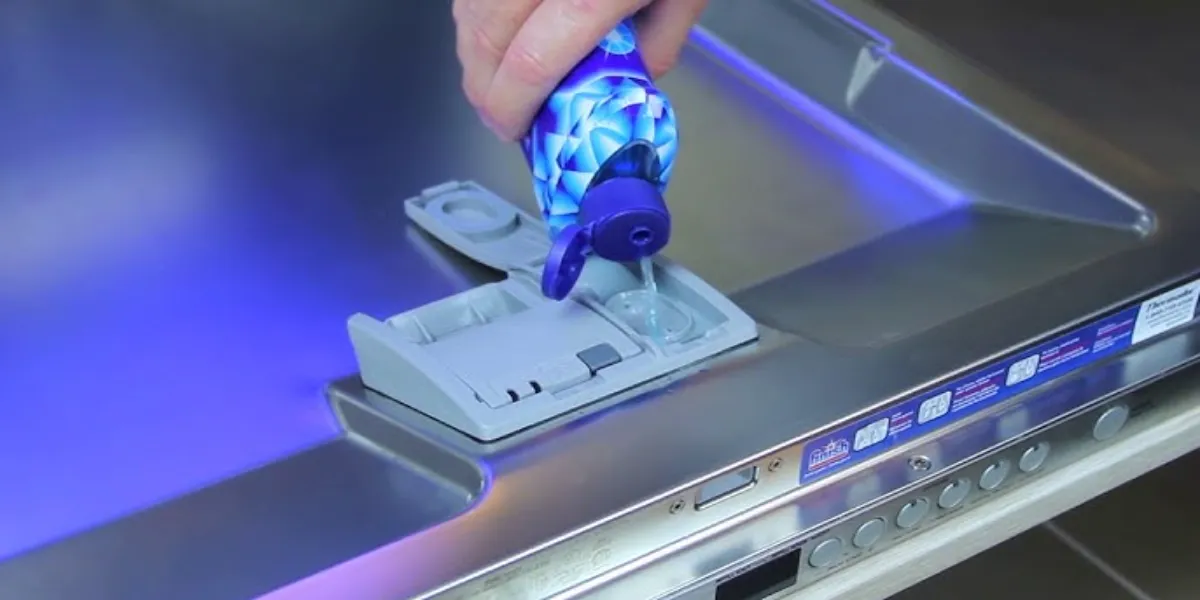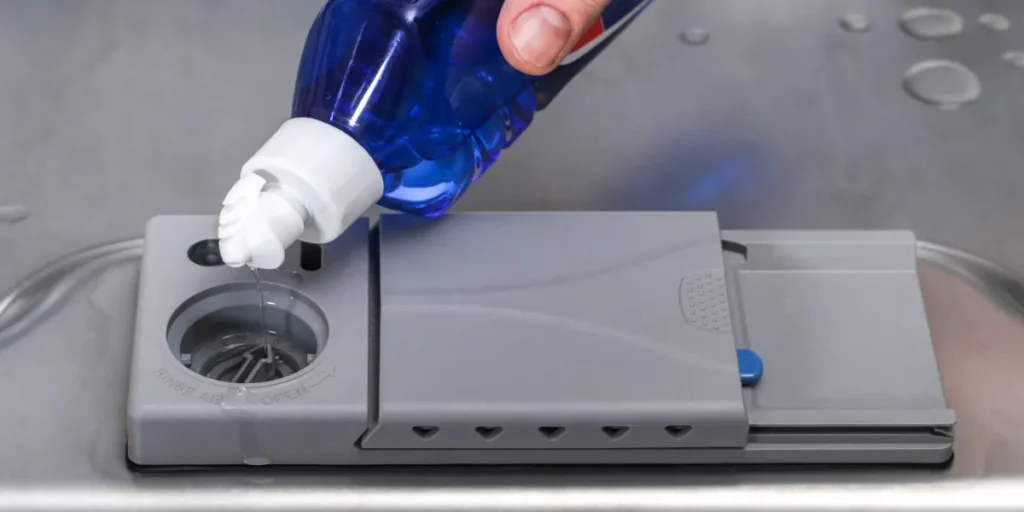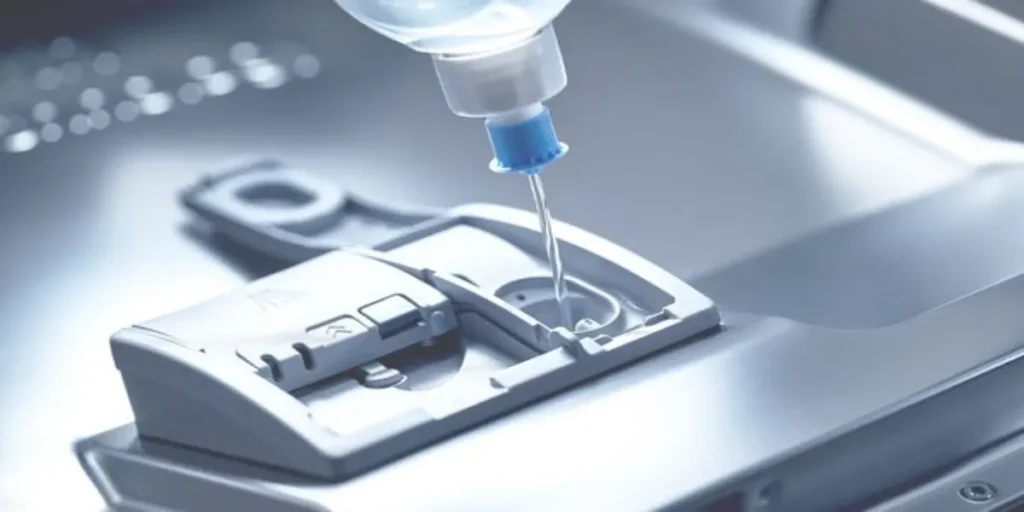If you have a Bosch dishwasher, you may wonder if you need to use a rinse aid to get the best results. But do you really need it for your Bosch dishwasher?
And are there any alternatives to rinse aid that are more eco-friendly or cost-effective?
In this blog post, we will answer these questions does Bosch Dishwasher need Rinse Aid.

Does Bosch Dishwasher Need Rinse Aid?
No, you do not have to use rinse aid in a Bosch dishwasher. With Bosch dishwashers, you don’t need rinse aid because they have advanced technology. Using residual heat from the final rinse, Bosch dishwashers use PureDry® to evaporate moisture from dishes. Some models also have CrystalDry™ or AutoAir™ features that enhance the drying performance even more.
The following table shows whether Bosch Dishwashers require rinse aid based on various models.
| Bosch Dishwasher Model | Requires Rinse Aid? |
|---|---|
| Bosch Series 300 | Yes |
| Bosch Series 500 | Yes |
| Bosch Series 800 | Optional |
| Bosch Ascenta | No |
| Bosch Benchmark | Optional |
| Bosch CrystalDry | No |
Why Some Dishwashers Recommend Using Rinse Aid?
Lower Surface Tension of Water
One key reason is the lowering of surface tension in water. Surface tension is like skin on water. It makes water droplets stick to dishes.
Rinse aid breaks this tension. So, water slides off more easily. This is a big deal for dishwashers that aren’t as advanced as Bosch models.
Speeds Up Drying
Drying dishes takes time and energy. If you have less water sticking around, your dishes dry faster. Rinse aid speeds up drying.
It can be a lifesaver for older dishwashers. These machines may not have fast drying tech like modern ones.
Less Energy Use
More water on dishes means more energy to dry them. You guessed it, rinse aid helps here too.
By making water slide off, cuts energy use. This is good for your bills and the planet!
Prevents Water Spots
Nobody likes water spots on their glasses or silverware. It’s not a good look. Rinse aid helps prevent these water spots.
The reduced surface tension stops water from forming droplets. These droplets are what leave spots.
Protects Delicate Dishware
Some dishes can’t handle a lot of heat. Materials like plastic can warp. Fine china can crack. Rinse aid helps protect these items.
It makes drying less harsh. That’s great for keeping your special dishes safe.
Works Well with Soft and Hard Water
Water quality changes depending on where you live. Hard water can leave mineral deposits on your dishes.
Soft water can be too gentle to remove all food particles. Rinse aid does its job well in both cases. It balances things out for a cleaner, shinier result.
How to Add Rinse Aid to Your Bosch Dishwasher?

You need to follow some simple steps to add a rinse aid to your Bosch dishwasher. Here is how to do it:
Dispenser location
Your first task is to find the rinse aid dispenser. It’s often located close to where you add the dishwasher detergent.
The dispenser usually has a lid with a small latch. That latch is what you’ll be interacting with.
Dispense Rinse Aid
Once you’ve found the dispenser, you need to open it up. You’ll find a latch on the lid of the compartment. Apply a little pressure on the latch with your finger.
Then gently pull the lid towards you. If you do it correctly, the lid should easily open.
Rinse aid pouring
Now that the dispenser is open, grab your bottle of rinse aid. Make sure to open the bottle’s cap. Align the bottle’s spout over the dispenser.
Slowly pour the liquid into the compartment. You’ll see a line inside labeled “max.” Pour the liquid until you reach this line, but not over it.
Overfilling the compartment could result in leaks, which you don’t want.
Secure the Lid
After filling up the dispenser, your next step is to seal the compartment. To do that, press down the lid until you hear a clicking sound.
This sound is your cue. It confirms that the compartment is sealed properly. If you miss this step, the rinse aid might leak out during the wash cycle.
Clean Any Spills
It’s common to spill a little rinse aid while filling. If this happens, take a dry cloth. Wipe away any spilled liquid from the dispenser area and the dishwasher door.
It’s not just about being neat. Rinse aid can be a bit slippery. Cleaning up keeps things safe.
Adjust the Settings
Lastly, you have to tweak the settings on your dishwasher. Your Bosch dishwasher allows you to control how much rinse aid is used per cycle.
You’ll find these settings in your dishwasher’s control panel. The user manual will guide you. It will show you step-by-step how to make these adjustments.
Alternatives to Rinse Aid for Bosch Dishwashers?
There are alternatives to rinse aids if you don’t want to use one in your Bosch dishwasher. There are some options that you can try, such as:
Vinegar:
If you have hard water, vinegar can reduce water spots and mineral deposits on your dishes.
Before running a cycle, add a small amount of white vinegar to the rinse aid compartment or to the bottom of the dishwasher.
Citric Acid Solutions:
In addition to removing hard water stains, citric acid can enhance dishware shine. You can buy citric acid powder online or in some stores and mix it with water to make a solution.
Pour this solution into the rinse aid compartment or into the bottom of the dishwasher before running a cycle.
DIY Rinse Aids:
Baking soda, lemon juice, essential oils, etc., can all be used as rinse aids to make them at home. You can find many recipes online for DIY rinse aids that claim to be effective and eco-friendly.
Use these products with caution as they may not be compatible with your dishwasher or detergent.
Factors Influencing the Need for Rinse Aid in Bosch Dishwashers

Whether you need to use rinse aid in your Bosch dishwasher or not depends on several factors, such as:
Water Hardness:
Hard water affects how well your dishwasher cleans and dries dishes. Hard water contains minerals that can leave spots, streaks, or films on your dishes.
Rinse aid can help prevent these problems by making the water softer and more slippery. You can check the hardness of your water by using a test kit or contacting your water provider.
Type of Detergent Used:
The type of detergent you use in your dishwasher also influences the need for rinse aid. Some detergents already contain rinse aid or other ingredients that help with drying and shining.
If you use these detergents, you may not need to add extra rinse aid to your dishwasher. Some detergents may not work well with rinse aid or may require a specific amount of it.
Follow the instructions on the detergent package and dishwasher user manual.
Dishwasher Model and Year:
The model and year of your Bosch dishwasher also affect the need for rinse aid. Technology and features in newer models make them more efficient and effective without rinse aid.
Bosch dishwashers have PureDry®, CrystalDryTM, or AutoAirTM features that enhance drying performance.
Older models may not have these features and may benefit more from using rinse aids.
Dishware Appearance Preferences:
Rinse aid is also dependent on how you like your dishes to look after washing. While some people don’t mind a few water spots or streaks on their dishes, others want them spotless and shiny.
Rinse aid can help you achieve the latter by reducing water marks and enhancing dishware shine.
Environmental Considerations:
The need for rinse aid also depends on your environmental concerns and values. Rinse aid is a chemical product that can have negative impacts on your health and the environment.
When not properly disposed of, this product can cause irritation, allergic reactions, or toxicity. If you care about these issues, you may want to avoid using rinse aid or use eco-friendly alternatives instead.
FAQs About Using Rinse Aid in Bosch Dishwashers
Is it safe to use rinse aid in Bosch dishwashers?
Yes, it is safe to use rinse aid in Bosch dishwashers as it helps improve drying and prevents water spots.
Can I use an alternative to commercial rinse aids?
Alternatives to commercial rinse aids, like vinegar or citric acid solutions, can be used in Bosch dishwashers.
How often do I need to refill the rinse aid compartment?
The frequency of refilling the rinse aid compartment depends on your dishwasher’s usage and water hardness.
Are there Bosch dishwashers that come with a built-in rinse aid?
Some Bosch dishwashers feature built-in rinse aid dispensers, but it varies by model.
Conclusion
Rinse aid can still be beneficial even if Bosch dishwashers are engineered with advanced features.
Rinse aid enhances the drying process, minimizes water spots, and can adapt to varying water hardness levels.
It’s not strictly necessary, but for those who want that extra sparkle and a faster drying time, it can be a worthwhile addition.

